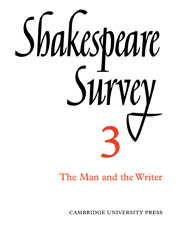Book contents
- Frontmatter
- Studies in the Life and Environment of Shakespeare Since 1900
- Shakespeare’s Deposition in the Belott-Mountjoy Suit
- Shakespeare’s Reading
- Recent Studies in Shakespeare’s Chronology
- Coriolanus and the Midlands Insurrection of 1607
- The Shakespeare Collection in the British Museum
- The Structural Pattern of Shakespeare’s Tragedies
- The ‘Meaning’ of Measure for Measure
- Hamlet and the Player Who Could NOT Keep Counsel
- Unworthy Scaffolds: A Theory for the Reconstruction of Elizabethan Playhouses
- Shakespeare in the German Open-Air Theatre
- Othello in Paris and Brussels
- Shakespeare and Denmark: 1900–1949
- International News
- A Stratford Production: Henry VIII
- The Year's Contributions to Shakespeare Studies: 1 Critical Studies
- 2 Shakespeare’s Life and Times
- 3 Textual Studies
- Index
- Plate Section
Shakespeare’s Reading
Published online by Cambridge University Press: 28 March 2007
- Frontmatter
- Studies in the Life and Environment of Shakespeare Since 1900
- Shakespeare’s Deposition in the Belott-Mountjoy Suit
- Shakespeare’s Reading
- Recent Studies in Shakespeare’s Chronology
- Coriolanus and the Midlands Insurrection of 1607
- The Shakespeare Collection in the British Museum
- The Structural Pattern of Shakespeare’s Tragedies
- The ‘Meaning’ of Measure for Measure
- Hamlet and the Player Who Could NOT Keep Counsel
- Unworthy Scaffolds: A Theory for the Reconstruction of Elizabethan Playhouses
- Shakespeare in the German Open-Air Theatre
- Othello in Paris and Brussels
- Shakespeare and Denmark: 1900–1949
- International News
- A Stratford Production: Henry VIII
- The Year's Contributions to Shakespeare Studies: 1 Critical Studies
- 2 Shakespeare’s Life and Times
- 3 Textual Studies
- Index
- Plate Section
Summary
John Selden is reported to have said: “No man is the wiser for his learning: it may administer matter to work in, or objects to work upon, but wit and wisdom are born with a man.” For two and a half centuries we have been asking how far learning administered matter for Shakespeare’s wit and wisdom to work in or objects for them to work upon. If a friend had put to Shakespeare the Second Outlaw’s question “Have you the tongues?”, would he have answered, with Valentine, “My youthful travail therein made me happy”?
Soon after his death two poets wrote about Shakespeare in terms that suggest that his learning, that is, his knowledge of Greek and Latin, was scanty. One of them said that he had "small Latin, and less Greek": the other praised him as Fancy's child, warbling "his native wood-notes wild". But Jonson and Milton are among the most learned scholar-poets this country has produced; and if we test Shakespeare, as perhaps they were testing him, by their own severe standards of scholarship, then indeed we must say he had not even the "edging or trimming of a scholar".
- Type
- Chapter
- Information
- Shakespeare Survey , pp. 14 - 21Publisher: Cambridge University PressPrint publication year: 1950



